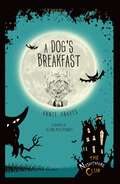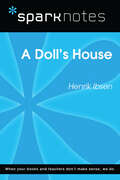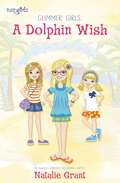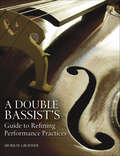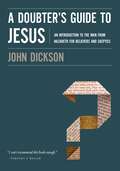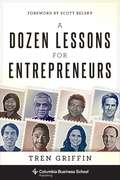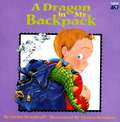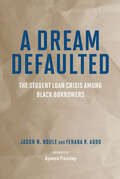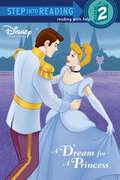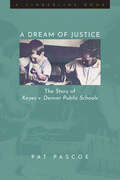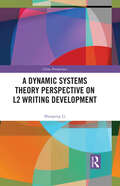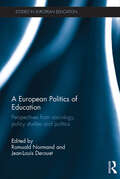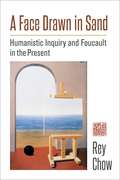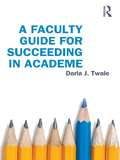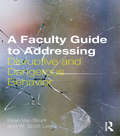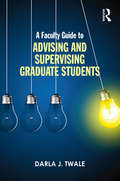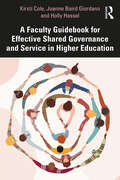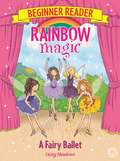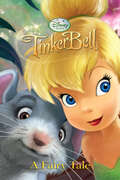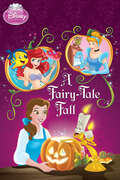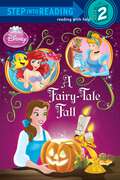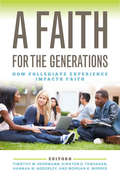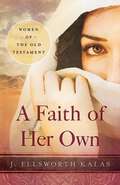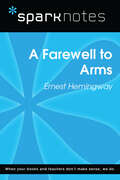- Table View
- List View
A Dog's Breakfast (The Nightmare Club #1)
by Annie GravesThe Nightmare Club is not for just ANYBODY. Only the spookiest, scariest stories get told at Annie's Halloween sleepovers―and if you can't take it, well, tough! Getting lost in the woods is no big deal for Glen. It's just one more thing he can whine and complain about. But then he encounters a strange creature―and gets on its bad side. Not long afterward, Glen disappears. What happened to him? Did his mysterious adventure in the woods have something to do with it? Only the members of the Nightmare Club will find out...
A Doll's House (SparkNotes Literature Guide Series)
by SparkNotesA Doll's House (SparkNotes Literature Guide) by Henrik Ibsen Making the reading experience fun! Created by Harvard students for students everywhere, SparkNotes is a new breed of study guide: smarter, better, faster.Geared to what today's students need to know, SparkNotes provides:chapter-by-chapter analysis explanations of key themes, motifs, and symbols a review quiz and essay topics Lively and accessible, these guides are perfect for late-night studying and writing papers.
A Dolphin Wish (Faithgirlz / Glimmer Girls)
by Natalie GrantJoin twins Mia and Maddie and their sidekick little sister, LuLu, as they travel the country finding adventure, mystery, and sometimes mischief along the way. Together with their famous mother, singer Gloria Glimmer, and their slightly wacky nanny Miss Twist, the sisters learn lessons about being good friends, telling the truth, and a whole lot more. In A Dolphin Wish a three-night stop in the city of San Diego seems like it might be just the break the girls need—lovely weather and great sights to see. That is until they hear animal handlers at “Watery World” talking about the trouble they’ve been having keeping the animals in their habitats. Mia and her sisters cannot resist a challenge and they talk Miss Twist into another visit to the educational amusement park to search for clues as to what or who is helping the animals escape.
A Double Bassist's Guide to Refining Performance Practices
by Murray GrodnerMurray Grodner draws on his distinguished career as a double bass musician and teacher in this compendium of performance philosophy, bowing and phrasing recommendations, tutorials on fingerings and scales, and exercises for bowing and string crossing. Grodner addresses technical obstacles in musical performance, offers advice on instrument and bow purchase, and provides a detailed approach to the fundamentals of bass playing. This guide is an invaluable resource for any bassist seeking to improve performance practices.
A Doubter's Guide to Jesus: An Introduction to the Man from Nazareth for Believers and Skeptics
by John DicksonA Doubter's Guide to Jesus is an introduction to the major portraits of Jesus found in the earliest historical sources. Portraits because our best information points not to a tidy, monolithic Jesus, but to a complex, multi-layered and, at times, contradictory figure. While some might be troubled by this, fearing that plurality equals incomprehensibility or unreliability, others take it as an invitation to do some rearranging for themselves, trying to make Jesus neater, more systematic and digestible.After two millennia of spiritual devotion and more than two centuries of modern critical research, we still cannot fit Jesus into a box. He is destined to stretch our imaginations, confront our beliefs, and challenge our lifestyles for many years to come.In A Doubter's Guide to Jesus readers will find themselves both disturbed and intrigued by the images of Jesus found in the first sources.
A Dozen Lessons for Entrepreneurs (Columbia Business School Publishing Ser.)
by Tren GriffinA Dozen Lessons for Entrepreneurs shows how the insights of leading venture capitalists can teach readers to create a unique approach to building a successful business. Through profiles and interviews of figures such as Bill Gurley of Benchmark Capital, Marc Andreesen and Ben Horowitz of Andreesen Horowitz, and Jenny Lee of GGV Capital, Tren Griffin draws out the fundamental lessons from their ideas and experiences. Entrepreneurs should learn from past successes but also be prepared to break new ground. While there are best practices, there is no single recipe they should follow. By better understanding the views and experiences of a wide range of successful venture capitalists and entrepreneurs, readers can discern which of many possible paths will lead to success.With insight and verve, Griffin argues that innovation and best practices are discovered by the experimentation of entrepreneurs as they establish the evolutionary fitness of their business. The products and services created through this experimentation that have greater fitness survive, and less-fit products and services die. Entrepreneurs have always experimented when creating or altering a business. What is different today is the existence of modern tools and systems that allow experiments to be conducted more cheaply and rapidly than ever before. Griffin shows that listening to what the best venture capitalists have to say is invaluable for entrepreneurs. Their experiences, if studied carefully, teach bedrock methods and guiding principles for approaching business.
A Dragon in My Backpack
by Elvira WoodruffBumps the dragon starts off the school year with fiery excitement! When the kings son gets his clothes muddy Sir Ben the knight must go to school in his place. Beastly Bumps, the local dragon, decides to join Sir Ben and see just what goes on in school. Find out what kind of fireworks happen when a brave knight and a fierce dragon face their first day of school!
A Dream Defaulted: The Student Loan Crisis Among Black Borrowers
by Jason N. Houle Fenaba R. AddoA Dream Defaulted explores how the student loan crisis disproportionately affects Black borrowers and why rising student debt is both a cause and consequence of social inequality in the United States.Jason N. Houle and Fenaba R. Addo offer a deft analysis of the growing financial crisis in education, examining its sources and its impacts. Based on more than five years of ongoing qualitative and quantitative research, this incisive work illustrates how the student loan system has not benefited all students equally. The authors tell the story of how first-generation college students, low-income students, and students of color are disadvantaged in two opposing phases of the process: debt accumulation and debt repayment. They further demonstrate that policies intended to mitigate financial burden and prevent default have failed to assist the people who most need help.Houle and Addo present these social and racial disparities within a broader context, tracing how centuries of institutionalized racism have contributed to social and economic inequities, perpetuating the racial wealth gap and leading to intergenerational inequality. Through interviews with borrowers, they illuminate the ways in which racial disparities affect who has college access, how and why people take on debt, and who has the ability to repay student loan debt after leaving college.Recognizing that the affordability crisis cannot be solved by higher education reform alone, Houle and Addo consider solutions. They argue that policy must extend beyond debt reduction and financial aid to address entrenched patterns of racial inequality and racial discrimination, both inside and outside institutions of higher education.
A Dream for a Princess (Step into Reading)
by Melissa Lagonegro RH DisneyCinderella has a dream–she wants to wear a beautiful gown and dance with the Prince at a Royal Ball. Will Cinderella’s fantasy come true? Find out in this Step 2 reader featuring the most popular and beloved Disney Princess.
A Dream of Justice: The Story of Keyes v. Denver Public Schools (Timberline Books)
by Pat PascoeA Dream of Justice is Colorado state senator and former teacher Pat Pascoe’s firsthand account of the decades-long fight to desegregate Denver’s public schools. Drawing on oral histories and interviews with members of the legal community, parents, and students, as well as extensive institutional records, Pascoe offers a compelling social history of Keyes v. School District No. 1 (Denver). Pascoe details Denver’s desegregation battle, beginning with the citizen studies that exposed the inequities of segregated schools and Rachel Noel’s resolution to integrate the system, followed by the momentous pro-integration Benton-Pascoe campaign of Ed Benton and Monte Pascoe for the school board in 1969. When segregationists won that election and reversed the integration plan for northeast Denver, Black, white, and Latino parents filed Keyes v. School District No. 1. This book follows the arguments in the case through briefs, transcripts, and decisions from district court to the Supreme Court of the United States and back, to its ultimate order to desegregate all Denver schools “root and branch.” It was the first northern city desegregation suit to be brought before the Supreme Court. However, with the end of court-ordered busing in 1995, schools quickly resegregated and are now more segregated than before Keyes was filed. Pascoe asserts that school integration is a necessary step toward eliminating systemic racism in our country and should be the objective of every school board. A Dream of Justice will appeal to students, scholars, and readers interested in the history of civil rights in America, Denver history, and the history of US education.
A Dynamic Systems Theory Perspective on L2 Writing Development (China Perspectives)
by Shaopeng LiFrom the perspective of empirical complex dynamic systems, this book investigates the complex and nonlinear process of L2 writing centering on three linguistic aspects of L2 writing development: vocabulary, syntax, and discourse.Combining dynamic systems theory, variation analysis, as well as data and cases studies from Chinese EFL learners’ writing, the book critically engages with the heated discussion on dynamic patterns of L2 writing development that focus heavily on the linguistic dimensions of complexity, accuracy, and fluency. The author expands the scope of the research by integrating both linguistic and functional dimensions of L2 output and examines the interaction and co-development of these dimensions. This framework helps delineate a full picture of individual learners’ L2 writing dynamic patterns across all components of their communicative repertoire. The research findings suggest the developmental path of writing system for each EFL learner may differ, which is influenced by their different learning characteristics and learning environments in China.The title will appeal to scholars interested in applied linguistics and second language acquisition. Suggestions on pedagogy and language learning advanced in the book will also make it a useful read for L2 language learner and TESOL and TEFL teachers.
A European Politics of Education: Perspectives from sociology, policy studies and politics (Studies in European Education)
by Romuald Normand and Jean-Louis DerouetA European Politics of Education proposes a sociology of education establishing connections between empirical data coming from European-scale comparative surveys, normative assumptions structuring actors’ representations and interpretative judgements, and a specific focus on Lifelong Learning policy areas. It invites readers to think about the place of standards, expertise and calculations in the European space from a common perspective, supported by a tradition of critical sociology and European political studies. The book: Addresses an important agenda: how the policies and politics of supranational Europe are making a European educational space Contains a response to the emergence of new epistemic governance and instruments at European level Contains contributions from the EU and the UK which give a comprehensive selection of perspectives and analysis of the field as it concerns Europe The complexity of the contemporary European education policy space is addressed here with new lines of inquiry as well as a reflexive outlook, on standardization, policy-making and actor engagement. Students and researchers of European policy studies, education policy analysts and theorists will all be particularly interested readers.
A Face Drawn in Sand: Humanistic Inquiry and Foucault in the Present
by Rey ChowLeadership, innovation, diversity, inclusiveness, sharing, accountability—such is the resounding administrative refrain we keep hearing in the contemporary Western university. What kinds of benefits does this refrain generate? For whom? What discursive incitements undergird such benefits? Although there are innumerable discussions of Michel Foucault in the English-speaking academy, seldom is his work used systematically to unravel the dead ends and potentialities of humanistic inquiry as embedded in these simple but dynamic questions.Rey Chow takes up this challenge by articulating the plight of the humanities in the age of global finance and neoliberal mores through a resharpened focus on Foucault’s concept “outside.” This general discussion is followed by a series of micro-arguments about several loosely linked topics: the biopolitics of literary study, visibilities and invisibilities, race and racism, sound/voice/listening, and confession and self-entrepreneurship. Against what she polemicizes as the moralistic-entrepreneurial norming of knowledge production, Chow foregrounds a nonutilitarian approach, stressing anew the intellectual and pedagogical objectives fundamental to humanistic inquiry: How to process, analyze, and evaluate different types of texts across languages and disciplines; how to form and sustain viable arguments; how to rethink familiar problems through less known as well as very well-known sources, figures, and methods. Above all, she asks in an abidingly humanistic spirit, how not to know all the answers before the questions have been posed.
A Facilitator's Guide To Diversity in the Classroom: A Casebook for Teachers and Teacher Educators
by Amalia Mesa-Bains Judith H. ShulmanA companion volume to Diversity in the Classroom, this guide presents 13 cases designed to help individuals and groups reflect on teaching. Specifically, it offers the information needed to use these cases in structured professional development experiences.
A Faculty Guide for Succeeding in Academe
by Darla J. TwaleAll too often a culture of silence permeates academia, where faculty and administrators ignore or misunderstand difficult situations. A Faculty Guide for Succeeding in Academe is a practical guide for prospective and current faculty that addresses real, complex issues that are too often left unexamined. Chapters explore typical aspects of the faculty career and life cycle—such as appointment, tenure, promotion, incivility, plagiarism, teaching, online delivery, interactions with chairs and deans, and performance appraisal—but focuses on the prickly issues as well as the routine. A Faculty Guide for Succeeding in Academe presents authentic, engaging vignettes that feature faculty and administrators as they maneuver through academe encountering authentic, difficult situations. Focusing on positive outcomes, each case is analyzed and readers are encouraged to reflect about the ways these incidents could have been resolved. Offering concrete suggestions and best-practices, this book provides insights that will help prospective, new, and current faculty maneuver more effectively through academe and their collegial culture. This important resource enhances a culture of openness and will help faculty gain direction and support in their career.
A Faculty Guide to Addressing Disruptive and Dangerous Behavior
by Brian Van Brunt W. Scott LewisCollege and university faculty are asked to serve an increasingly diverse and at-risk population of students. They face disruptive and dangerous behaviors that range from speaking out of turn or misusing technology, to potentially agressive behavior. A Faculty Guide to Addressing Disruptive and Dangerous Behavior provides the practical ideas and guidance necessary to manage and mitigate these behaviors. Grounded in research and theory that addresses the interplay of mental health, substance abuse, and aggression that may enter the college classroom, this accessible book serves as a necessary guide for busy faculty members facing challenging situations in their classrooms. Special features include: Vignettes from seasoned faculty that provide thoughtful reflections and advice from everyday experience. Research-based suggestions and intervention techniques to help faculty better assess, intervene, and manage difficult behavior. Coverage of special populations, including nontraditional, veteran, and millennial students. Discussion of the latest laws and regulations that should affect and inform faculty’s decisions.
A Faculty Guide to Advising and Supervising Graduate Students
by Darla J. TwaleThis practical guide provides college and university faculty with resources for supervising and advising graduate assistants, guiding doctoral students through the dissertation process, and preparing the next generation of scholars. Exploring common situations that faculty and their graduate students encounter, this book provides the theoretical foundation and best practices for faculty to improve their advising and supervising practices. Coverage Includes: Working with part-time, online, doctoral, and masters students Supervising assistantships, fellowships, internships, practicums, and residencies Chairing dissertations and theses Preparing students for conferences and presentations
A Faculty Guidebook for Effective Shared Governance and Service in Higher Education
by Holly Hassel Kirsti Cole Joanne Baird GiordanoA Faculty Guidebook for Effective Shared Governance and Service in Higher Education bridges the gap between training and work experience, offering a blueprint for academic workers' effective participation in service and governance in higher education. Unpacking skills of problem solving, critical analysis, politicking, negotiation, coalition building, and emotional labor, this book provides flexible, adaptable strategies that are relevant across institutional settings and that draw from research, experience, and multiple perspectives. The principles in the book will guide faculty in developing policies and implementing practices to better serve students, colleagues, communities, and the larger mission of postsecondary education. With an emphasis on shared governance and committee service that advances equity, inclusion, access, and justice, this book pushes back on the view that service is not worth our time and offers specific recommendations for doing governance work effectively. Chapters provide strategies for policy development, implementation, and assessment, as well as tools for navigating common roadblocks to accomplishing sustainable and progressive faculty leadership. This accessible book demystifies a critical part of the academic workload, and is designed for instructors, faculty, and academic advisors at any stage of their career who want to advocate for and create better conditions in higher education.
A Fairy Ballet: Book 7 (Rainbow Magic Beginner Reader #7)
by Daisy MeadowsLearning to read is fun with the Rainbow Magic Fairies! Developed in conjunction with Early Years reading consultants and based on the most up-to-date educational research, the Rainbow Magic Beginner Readers are the perfect way to introduce your child to the magical world of reading.
A Fairy Tale (Disney Fairies)
by Disney PressTHE FAIRIES OF Pixie Hollow are in for some surprises when Tinker Bell decides she wants to learn a new talent. Find out what happens in this Step 3 reader, which simply retells Disney’s direct-to-DVD movie Tinker Bell.
A Fairy-Tale Fall (Disney Princess)
by Apple JordanHow do Cinderella, Belle, Ariel, and all the Disney princesses celebrate Halloween? Princess fans will love finding out in this original Step 2 reader!
A Fairy-Tale Fall (Step into Reading)
by Apple JordanHow do Cinderella, Belle, Ariel, and all the Disney princesses celebrate Halloween? Princess fans will love finding out in this original Step 2 reader!
A Faith for the Generations: How Collegiate Experience Impacts Faith
by Timothy W. Hermann Kirsten D. Tenhaken Hannah M. Adderley Morgan K. Morris"The reshaping of our cultural and social landscape continues, creating unprecedented opportunities. But one question remains: Is a life of faith worth embracing?A Faith for the Generations explains how a Christian campus, a classroom, or even a simple mentoring relationship can flourish and serve in passing on faith to today's emerging adults.The essays included in this monograph cover a variety of topics related to the theme originally addressed at the 2014 Taylor University Higher Education Symposium: ""A Faith for the Generations: How Collegiate Experience Impacts Faith."" After this brief introductory chapter, the monograph—as did the symposium—begins with an interview with Christian Smith, previously noted as a key voice in the current dialogue regarding emerging adult spirituality. This interview is not only insightful, but it also creates an excellent context for what follows in subsequent chapters."
A Faith of Her Own: Women of the Old Testament
by J. Ellsworth KalasIn A Faith of Her Own: Women of the Old Testament, popular author J. Ellsworth Kalas focuses on women who were crucial—some in obvious and some in less obvious ways—to the story of the Old Testament. Kalas takes a look at several different women of the Old Testament. He examines the Scriptures to see what we can learn about them and from them, including their defining characteristics, how they fit into as well as shaped the Old Testament story, and how their stories of strength, courage, perseverance, and faith have shaped our lives as believers today.Chapters include:- The Ultimate First Lady (Eve)- A Woman Who Married Trouble (Cain's Wife)- The Compleat Woman (Sarah)- A Mother Who Played Favorites (Rebecca- They May Have Been Twins -- But Not Identical (Leah & Rachel)- The Original Big Sister (Miriam)- God Saw Beyond Her Profession (Rahab)- Israel's First Female Prime Minister (Deborah)- The Perfect In-Laws (Ruth & Naomi)- The Ladies Chorus (The Women of Bethlehem: Ruth 4: 13-17)- Counslor to the Clergy (Huldah)- Married to a Husband's Career (Wives of Old Testament Prophets)A discussion guide is included.
A Farewell to Arms (SparkNotes Literature Guide Series)
by SparkNotesA Farewell to Arms (SparkNotes Literature Guide) by Ernest Hemingway Making the reading experience fun! Created by Harvard students for students everywhere, SparkNotes is a new breed of study guide: smarter, better, faster.Geared to what today's students need to know, SparkNotes provides:chapter-by-chapter analysis explanations of key themes, motifs, and symbols a review quiz and essay topics Lively and accessible, these guides are perfect for late-night studying and writing papers.
